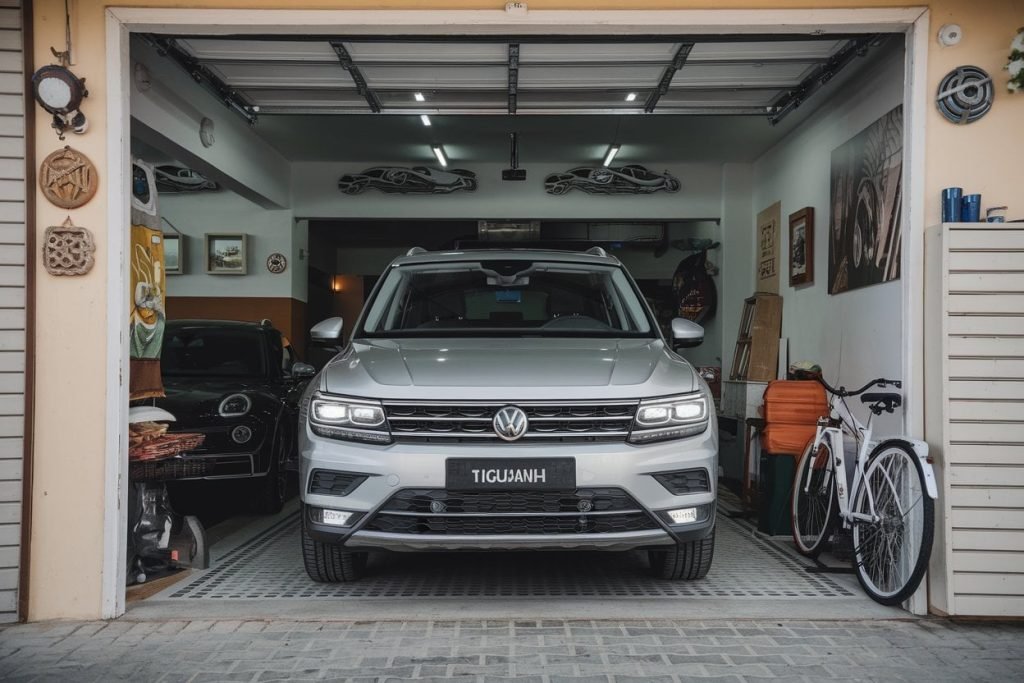Is your Volkswagen Tiguan struggling with Dubai’s heat? One minute you’re driving fine, the next, steam starts rising from the hood. Overheating isn’t just annoying—it can wreck your engine if ignored. A clogged radiator, leaking coolant, or a failing thermostat could be the culprit. And in Dubai’s scorching 50°C summers, your cooling system works harder than ever. Don’t wait until it’s too late—our Volkswagen specialists will diagnose and fix the issue fast. Plus, get a 15% discount on all Volkswagen Tiguan overheating repairs this month!

Your Tiguan overheating is a serious problem that can lead to engine failure if ignored. The cooling system is designed to keep the engine at a safe temperature, but when something goes wrong, heat builds up quickly. Here’s what happens step by step:
If you notice Tiguan overheating signs, stop driving immediately. Let the engine cool down and get it checked by a Volkswagen specialist in Dubai. Book your repair today and get 15% off on coolant system fixes!
Ignoring Tiguan overheating is a costly mistake. When your Volkswagen Tiguan engine overheats, extreme heat damages internal components, leading to major repair costs or even a complete engine replacement. Here’s exactly how overheating destroys your engine step by step:
The cylinder head expands when exposed to extreme heat. If the engine temperature stays high, the metal warps, leading to compression loss, coolant leaks, and misfiring cylinders. This causes poor acceleration and engine misfires, reducing overall performance.
A blown head gasket is one of the most expensive issues caused by Tiguan overheating. When the gasket fails, coolant leaks into the combustion chamber, leading to white exhaust smoke, bubbling coolant, and overheating cycles.
Excess heat weakens pistons and exhaust valves, causing loss of engine compression. This results in rough idling, difficulty starting, and reduced power output. If not fixed, the engine may seize completely.
High temperatures thin out engine oil, making it less effective at lubrication. Metal parts rub together, causing bearing wear, crankshaft damage, and internal scoring. Without proper lubrication, the engine can suffer complete failure.
Overheated coolant loses efficiency, leading to radiator clogging, thermostat failure, and water pump breakdown. Without a working cooling system, overheating worsens quickly, increasing the risk of engine seizure.
If Tiguan overheating is ignored, metal components expand beyond their limit, causing pistons to seize inside the cylinders. At this stage, the engine is beyond repair, and the only solution is a full engine replacement.
Warning Signs: If you notice white smoke from the exhaust, low coolant levels, a rising temperature gauge, or poor acceleration, your Volkswagen Tiguan engine may already be at risk.
Solution? Stop driving immediately and let a Volkswagen Tiguan overheating specialist in Dubai inspect the issue. Book now and get 15% off on cooling system repairs!
Tiguan overheating is a major issue that can lead to engine failure if ignored. A faulty cooling system, low coolant levels, or a damaged radiator can cause your Volkswagen Tiguan engine to overheat. Below are the main reasons why your Tiguan overheats:
Ignoring Tiguan overheating issues can lead to serious engine damage. Our Volkswagen specialists in Dubai provide radiator repairs, coolant system flushes, and thermostat replacements. Book your overheating repair today and get 15% off!

The cost of VW Tiguan overheating repair in Dubai depends on the cause of the problem and the parts that need replacement. Ignoring overheating can lead to serious engine damage, increasing repair expenses. Below is a breakdown of estimated repair costs for common Tiguan overheating issues:
Driving with an overheating engine can lead to expensive repairs or even complete engine failure. If your Tiguan engine temperature is rising, don’t wait—get it checked today. Book your overheating repair now and get 15% off on cooling system services!
If your Volkswagen Tiguan is overheating, there is a cooling system failure that needs immediate attention. Ignoring the issue can lead to blown head gaskets, warped cylinder heads, or complete engine failure. Our Volkswagen specialists in Dubai use advanced diagnostic tools to find the exact cause and fix it before serious damage occurs. Here’s how we diagnose Tiguan overheating in just four steps:
The coolant reservoir and radiator are inspected for low coolant levels, which may be caused by leaks or evaporation. The engine bay and the ground under the car are checked for coolant stains near the radiator, hoses, or water pump. A UV dye test helps detect hidden leaks inside the engine.
The radiator is checked for clogs, rust, or damage that could stop coolant from flowing. The radiator fan is tested to ensure it switches on at the right temperature. A faulty fan motor, relay, or wiring can cause overheating. The water pump is inspected for leaks or worn-out parts that prevent coolant from circulating.
The thermostat is removed and checked to see if it opens and closes properly. A stuck thermostat can block coolant flow, leading to overheating. A pressure test is done to find internal leaks in the radiator, hoses, or heater core. The system is also bled to remove air pockets, which can block coolant movement.
A diagnostic scan tool is used to check for overheating-related errors in the ECU (Engine Control Unit). A blown head gasket test is done by inspecting the oil for coolant contamination. If the oil appears milky, coolant has leaked into the engine. A combustion gas test checks if exhaust gases are entering the coolant, a sign of serious engine damage.
If your Volkswagen Tiguan is overheating, stop driving and get it checked before bigger problems occur. Our Volkswagen repair specialists in Dubai will find the cause and fix it quickly. Book your VW Tiguan overheating diagnosis today and get 15% off on cooling system repairs!
If your Volkswagen Tiguan is overheating, it needs urgent attention to prevent engine damage. A faulty radiator, leaking coolant, or a broken thermostat can cause the engine temperature to rise, leading to costly repairs. Our Volkswagen specialists in Dubai use advanced diagnostics to find the exact problem and fix it using genuine OEM parts.
Don’t risk a blown head gasket or complete engine failure. Book your VW Tiguan overheating repair today and get 15% off on cooling system services, including radiator, thermostat, and water pump repairs. Call now or visit our Volkswagen repair workshop in Dubai for a same-day diagnosis!
Trust our team of Expert Volkswagen Mechanics at our Volkswagen Service Center in Dubai for all your Volkswagen Repair and service needs.
Our Top-Notch Volkswagen Service Center in Dubai have the advanced diagnostic tools and Volkswagen experts to accurately identify and resolve any issues with your Volkswagen.
With over 1200+ Volkswagen repaired, our Volkswagen Service Center in Dubai is the trusted Garage for comprehensive and expert Volkswagen Repair services.
Most of the vehicles get damaged just because of maintenance neglect you take
Yes, Tiguan overheating can damage the turbocharger, especially in 2.0L turbocharged models. The turbo relies on engine oil and coolant to stay cool. If the engine overheats, the oil thins out, reducing lubrication and causing turbo failure. In extreme cases, the excess heat can warp the turbo housing or crack internal components, leading to boost loss, blue smoke from the exhaust, and reduced power.
If your Volkswagen Tiguan overheats in stop-and-go traffic but runs fine at higher speeds, the radiator fan is likely malfunctioning. The fan helps cool the radiator when airflow is low, such as when idling or moving slowly. A faulty fan motor, broken relay, or damaged temperature sensor can prevent the fan from turning on, leading to rapid overheating in traffic. On highways, the increased airflow naturally cools the radiator, preventing overheating.
Some Volkswagen Tiguan models have an auxiliary water pump, which helps circulate coolant even after the engine is turned off. If this pump fails, hot coolant stays trapped in the engine, leading to temperature spikes and premature wear on engine components. A failing auxiliary pump can also affect the turbocharger cooling system, increasing the risk of heat-related turbo damage.
Yes, low AC refrigerant levels can indirectly contribute to Tiguan overheating. When the refrigerant is low, the AC compressor works harder, increasing engine load and heat production. This puts extra strain on the cooling system, especially in hot climates like Dubai, where the engine already runs at high temperatures. If the radiator fan is weak or the coolant system is not working properly, overheating happens faster.
The heater core is part of the cooling system, as it helps dissipate engine heat by transferring it to the cabin. If the heater core gets clogged with dirt, rust, or old coolant, it blocks coolant flow, making the engine work harder to stay cool. Symptoms of a clogged heater core include overheating, weak cabin heat, and coolant leaks inside the vehicle.
Yes, a faulty ECU (Engine Control Unit) can cause overheating by mismanaging temperature regulation. If the ECU fails to activate the radiator fan at the right time, or sends incorrect signals to the thermostat and water pump, the engine will overheat even if the cooling system components are functional. A professional ECU scan is needed to diagnose software or sensor-related issues.
Yes, using the wrong coolant type can cause blockages, poor heat transfer, and corrosion inside the cooling system. Volkswagen recommends G13 or G12+ coolant, which is silicate-free and designed for aluminum engines. Mixing it with generic green or orange coolants can create sludge buildup, leading to radiator clogs and reduced cooling efficiency.
“Talk to a Volkswagen Expert Now by booking a call, and get personalised solutions for your Volkswagen unique needs and requirements.”
+971564646081
